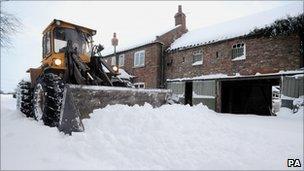Burst pipes snow weather warning from water firms
- Published

Snow and ice may be hiding cracked pipes, water companies warned
Householders are being warned to guard against burst pipes and central heating problems as the cold spell continues.
London fire crews went to 163 floodings in the last four days of November, up 150%, with Thames Water answering 150 reports a day, twice the seasonal norm.
Insurers say burst pipe payouts could top £650m, while Scottish Water says more leaks may be hidden under snow.
British Gas has taken 160,000 calls about faulty heating systems since the weekend - up 37% on last week.
The firm said it had drafted in extra engineers to deal with "exceptional" levels of boiler breakdowns.
"Every year from October onwards we encourage people to check their boilers, before the cold weather really kicks in, and ensure they don't get caught out," said its winter homes expert Robin Bray.
Scottish Water said that while problems with burst pipes had yet to materialise, it was prepared for the predicted increase in calls.
"With a thaw we do expect to see some issues," a spokesman said.
"The snow could be hiding leaks or the water is frozen."
Hairline weaknesses
Temperatures fell to -19C (-2F) overnight in Altnaharra in the Scottish Highlands, while in most other cities and towns in Scotland the temperature fell to nearer -6C (21F).
A Thames Water spokesman said that although the number of leaks was double a typical winter day, the company also expected the real figure to be much higher, with snow and ice masking many problems.
He asked any of the firm's 13.8 million customers to report burst or leaking water pipes if they spot them on its 20,000-mile network.
Water pipes, especially older cast-iron ones, burst more when water in reservoirs cools below 5C, the company said.
When the cold water is pumped through pipes, it makes them contract and where there are hairline weakness, they can break.
Insurance claims
The Association of British Insurers said the industry paid out £644m to homeowners and businesses last winter and expects this year to be worse.
It is urging people to take simple steps to try to protect their property, including ensuring their loft water pipes and water tanks are insulated, as well as making sure their property is as warm as possible if they are away from home.
Research conducted for insurer Direct Line has concluded that - out of 2.6m households affected by weather-related damage last winter - 17% suffered from burst pipes and 24% from a central heating failure.
The findings are based on a sample of 2,671 people.
National Grid, which looks after the gas mains, said the cold weather can cause more problems than warm weather.
Most gas mains are laid deep enough to protect them against the effects of cold weather, but during extended periods of very low temperatures, frozen earth can cause ground movement which damages the iron pipes.
National Grid has a 30-year programme to replace iron gas pipes with plastic pipes, which are highly resistant to corrosion, flexible and unaffected by temperatures and ground movement.
- Published3 December 2010
- Published2 December 2010